

Sustainability: All on the same page?
“Sustainability” is a term that has rapidly been incorporated into everyday business language, often as an overarching term to encompass ESG (or Environment, Social, and Governance). It broadly focuses on delivering prosperity with consideration of people and planet. [1]
A look at the frequency of mentions of this term on social media also suggests that the expression is increasingly being used in online conversations (Figure 1).
But do we really understand what people mean when they use this word, and does it hold the same meaning for everyone?

What does “sustainability” mean to people across the world and in different contexts?
What we asked:
We asked people across 34 countries which of 14 topics – broadly based on the UN’s Sustainable Development Goals (SDGs) – they most associate with the word “sustainability”.
What we learned: Environment is primary
Environmental themes dominate, with energy, environmental damage, waste and climate change proving to be the four most strongly associated topics. “Affordable and clean energy” comes top, with almost a third (28%) choosing it as one of the topics they most associate with “sustainability” (Figure 2).
Indeed the top six associations with the term sustainablity all cover “E” topics, with “accessing clean water and nutritious food” and “ensuring good health and wellbeing” for all ranking 7th and 8th (Figure 2).
Even further down the list are more social issues like poverty, inequality, productive employment, inclusivity, education, peace and justice, with gender equality having the lowest association of all. So we see that, at a top-line level, environment related topics are more clearly linked to the term “sustainability” than social issues.
What is being discussed when #sustainability is used?
When we look at what people are saying online, we see again that the public associate the term “sustainability” more strongly with environmental issues than with social or governance issues. We carried out topic modelling of online conversations relating to the use of “#sustainability” drawn from three months of all English language content over summer 2022.[2] By curating a list of over 100 topics down to 34 macro topics that describe online conversation (shown in Figure 3), we could see that water, climate change and packaging feature strongly.

However, both Sustainability in Business and ESG Initiatives are also very prominent, suggesting that conversations do move beyond E for environment – as we see in the 34-country quantitative analysis.
And how do employees interpret sustainability?
Taking a third perspective (beyond survey and online conversations), we asked employees what they thought “sustainability” meant when it is used in an organisational context.[3]
While organisations use “sustainability” to refer to ESG in its broadest state, our research shows that employees have a narrower understanding of the term. Once again environment dominates, with a majority of responses referring to being environmentally friendly.
A quarter of responses associate the term with thinking about the future, with approximately one in 10 mentioning clear and focused business strategy. Social associations, such as looking after communities, focusing on employees and supporting clients, follow behind.
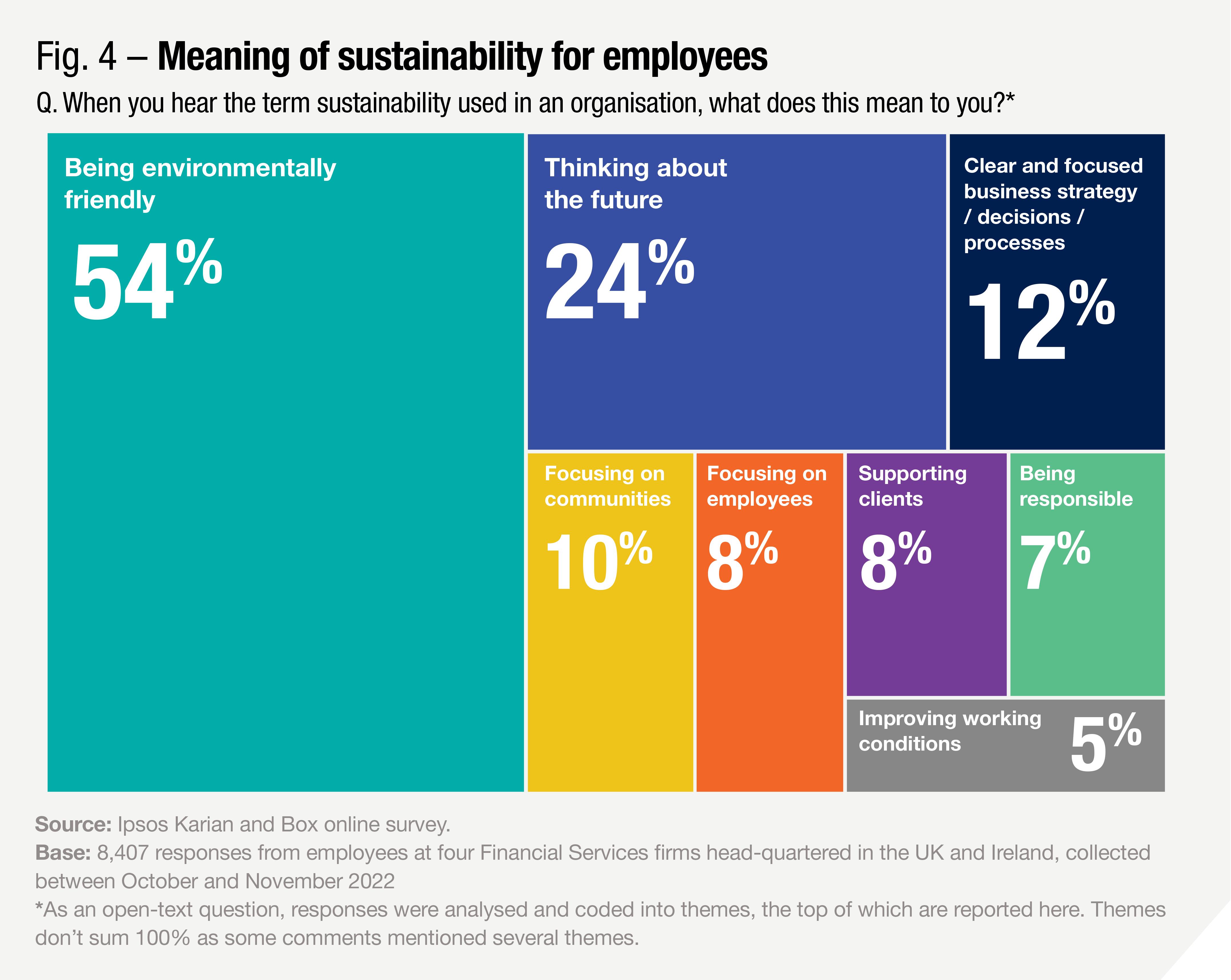 This latest analysis is restricted to the Financial Services sector; our sense is that this view could be common across many sectors.
This latest analysis is restricted to the Financial Services sector; our sense is that this view could be common across many sectors.
 A global average hiding regional differences
A global average hiding regional differences
Associations with the term “sustainability” vary greatly across the world (see Figure 5 over page). This is likely driven by the very different political, environmental, and social backdrops in each country, as well as the particular cultural context.
On average globally, almost a quarter (24%) associate sustainability with “only producing and consuming what is needed and eliminating waste”. But this global average is held up notably by stronger associations across European countries like Romania, Hungary (both 36%), Great Britain (35%), Italy, Ireland and France (34% each).
At the same time, while only 15% across 34 countries associate “full and productive employment and decent work for all” with sustainability. This rises to almost three in 10 in Argentina and Peru (both 29%) and to almost four in 10 in Indonesia (37%). And linkage to “inclusive and quality education for all” is much higher in Saudi Arabia (29%) and the United Arab Emirates (24%) than the global average of 12%. Of 34 countries, Malaysia has the most accurate understanding of the word “sustainability”, with environmental, social and governance issues all appearing in the top five topics most strongly associated with the term.
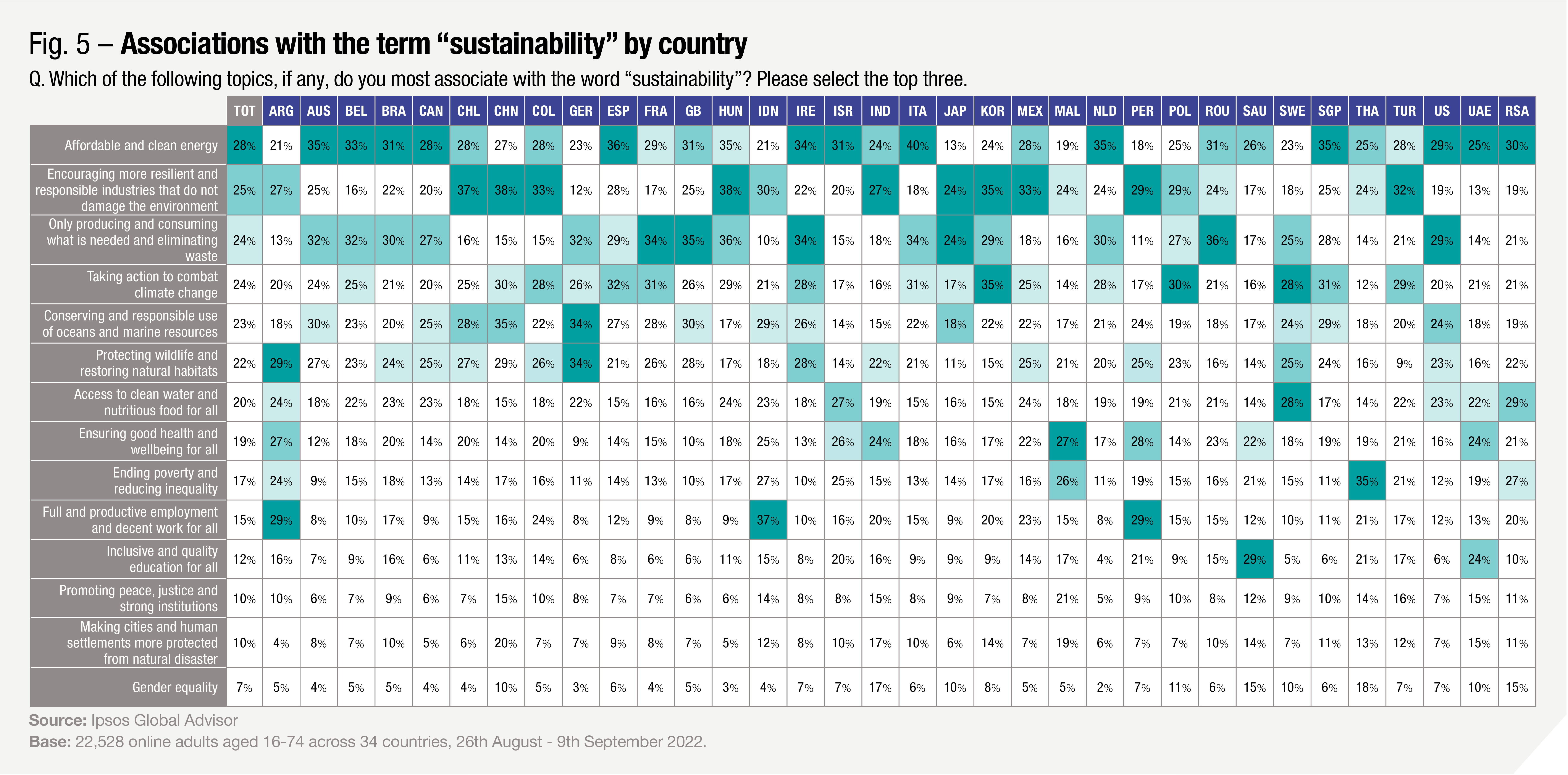
What’s the priority?
Although when the public hear the word “sustainability” they are more likely to think of environmental topics, their actual priorities spread more evenly across E and S.
When we gave citizens from across 34 countries a list of sustainability topics and asked which issue they most want their country to prioritise, providing “affordable and clean energy” came number one (26%). The focus then switches to core social topics, with “ending poverty and reducing inequality” and “ensuring good health and wellbeing for all” completing citizens’ top three priorities (both 23%) (Figure 6).
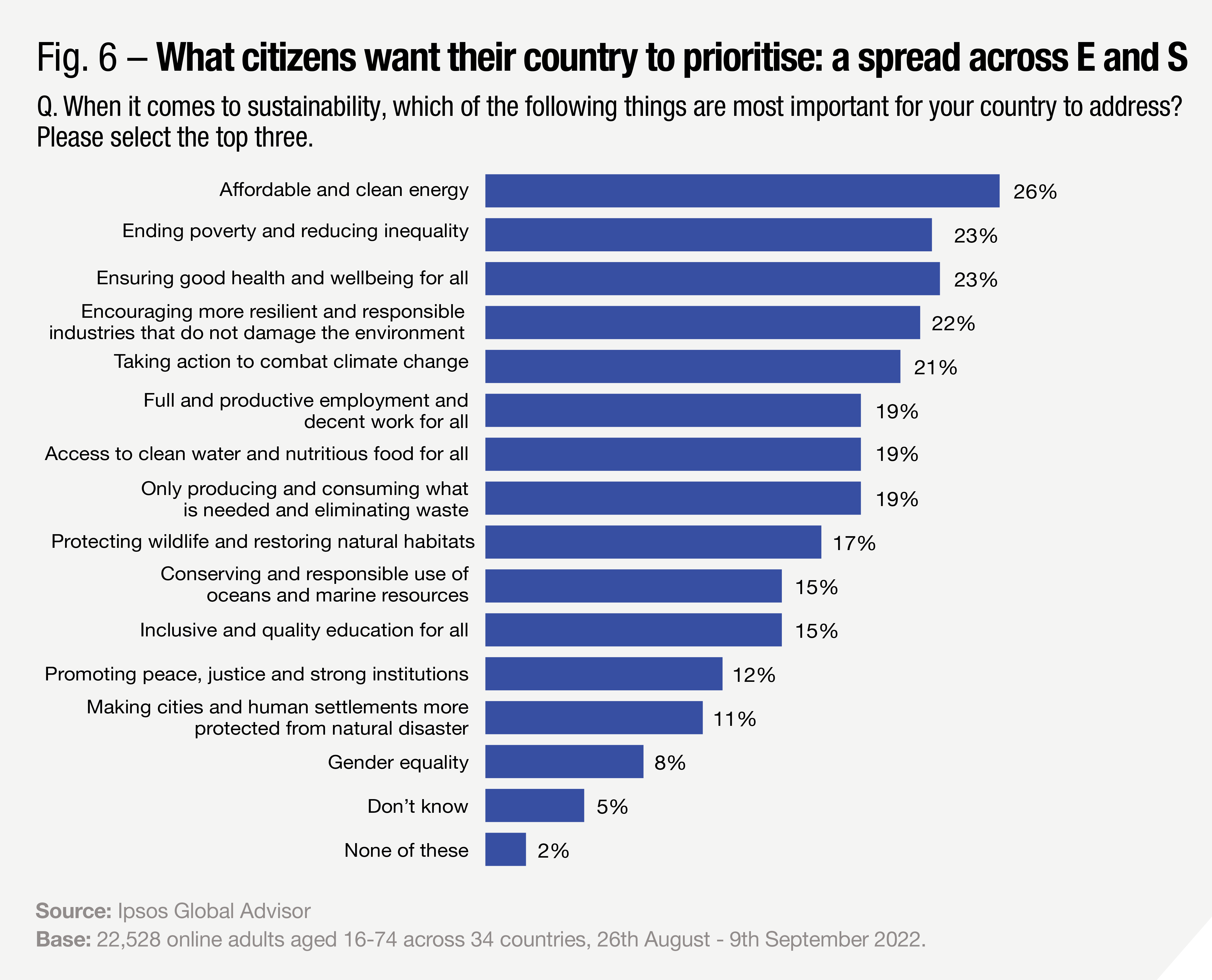 This aligns with what we see in Ipsos’ What Worries the World survey:[4] people are most likely to focus on very social concerns that impact them day-to-day rather than on environmental issues which can sometimes feel more remote. However as may be expected, the two social issues of poverty & inequality and good health/wellbeing for all are not as widely prioritised in developed economies as they are in developing economies.
This aligns with what we see in Ipsos’ What Worries the World survey:[4] people are most likely to focus on very social concerns that impact them day-to-day rather than on environmental issues which can sometimes feel more remote. However as may be expected, the two social issues of poverty & inequality and good health/wellbeing for all are not as widely prioritised in developed economies as they are in developing economies.
The global focus then switches back to tackling climate change, which comes in as the fourth priority – hardly surprising given that one in two globally tell us climate change has already had a severe effect in the area where they live.[5]
Across the 34 countries, “full and productive employment and decent work for all” is the fifth most important topic that the global public think their country should focus on (chosen by 19%), but this is noticeably more important for citizens in Argentina (37%), Indonesia (36%) and Peru (30%).
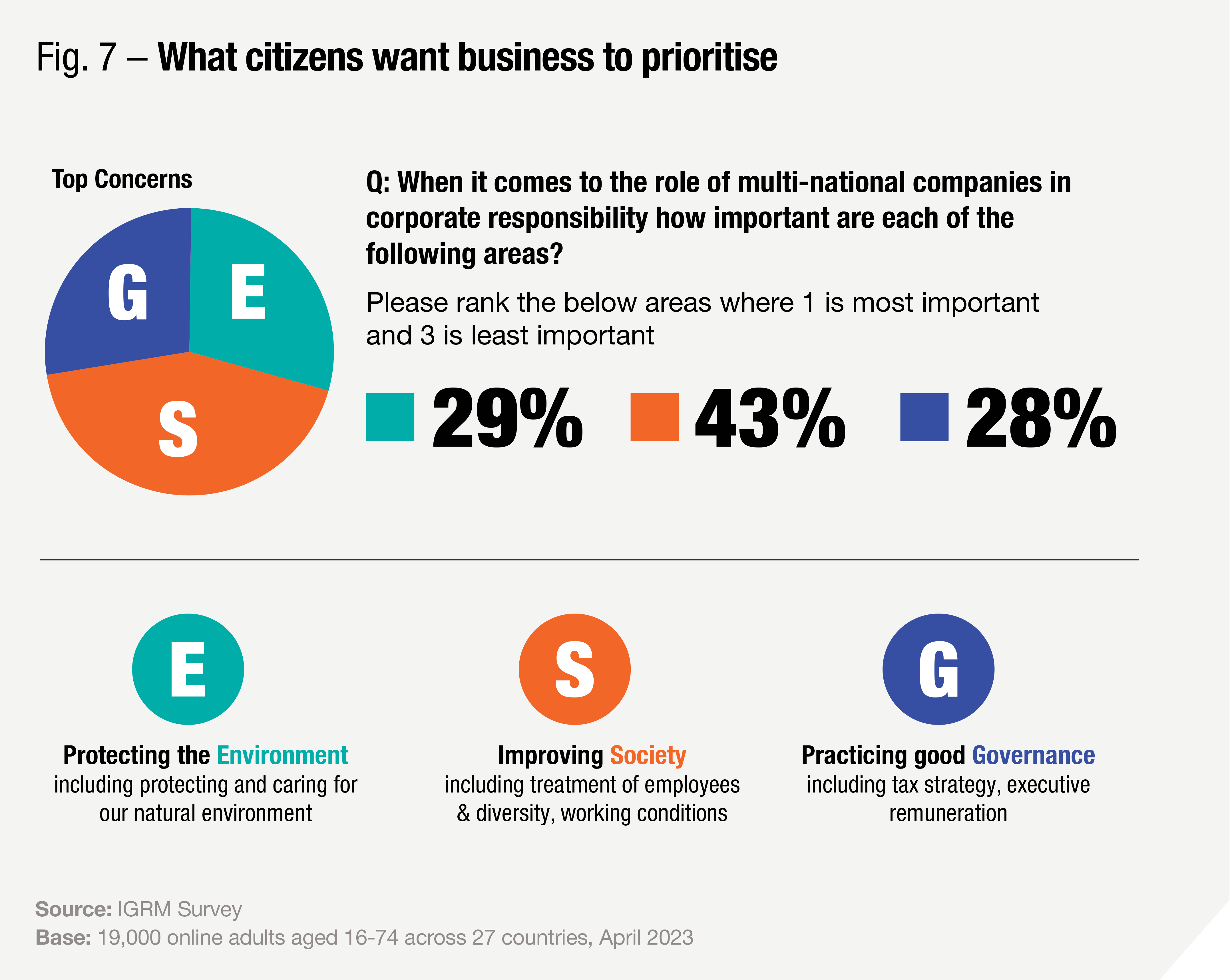 When it comes to desired action to create a sustainable future, it is important to note the more balanced spread between environmental and social issues. This echoes what we have seen in our research elsewhere: when citizens are asked about the role of multi-national companies in corporate responsibility, they assign relatively equal priority to environmental, social and governance (ESG) topics – although the most recent data shows that the weight has shifted to focus more on the ‘S’ of improving society.[6]
When it comes to desired action to create a sustainable future, it is important to note the more balanced spread between environmental and social issues. This echoes what we have seen in our research elsewhere: when citizens are asked about the role of multi-national companies in corporate responsibility, they assign relatively equal priority to environmental, social and governance (ESG) topics – although the most recent data shows that the weight has shifted to focus more on the ‘S’ of improving society.[6]
Considering the strength of their association with the term “sustainability”, issues relating to nature are relatively low among the priorities that citizens want their country to address. That said, “protecting wildlife and restoring natural habitats” remains more of a priority for Australia (27%), Germany (26%), China (24%), and Great Britain (23%), compared with a global country average of 17%. Interestingly, work with EDF[7] shows that citizens from Australia, Germany, and Great Britain are among the least likely across 30 markets to take part in protests to combat climate change (which directly impacts these habitats). Perhaps an air of the ‘say-do’ or perhaps ‘say-care enough’ gap?
Citizens assign relatively equal priority to environmental, social and governance (ESG) topics.
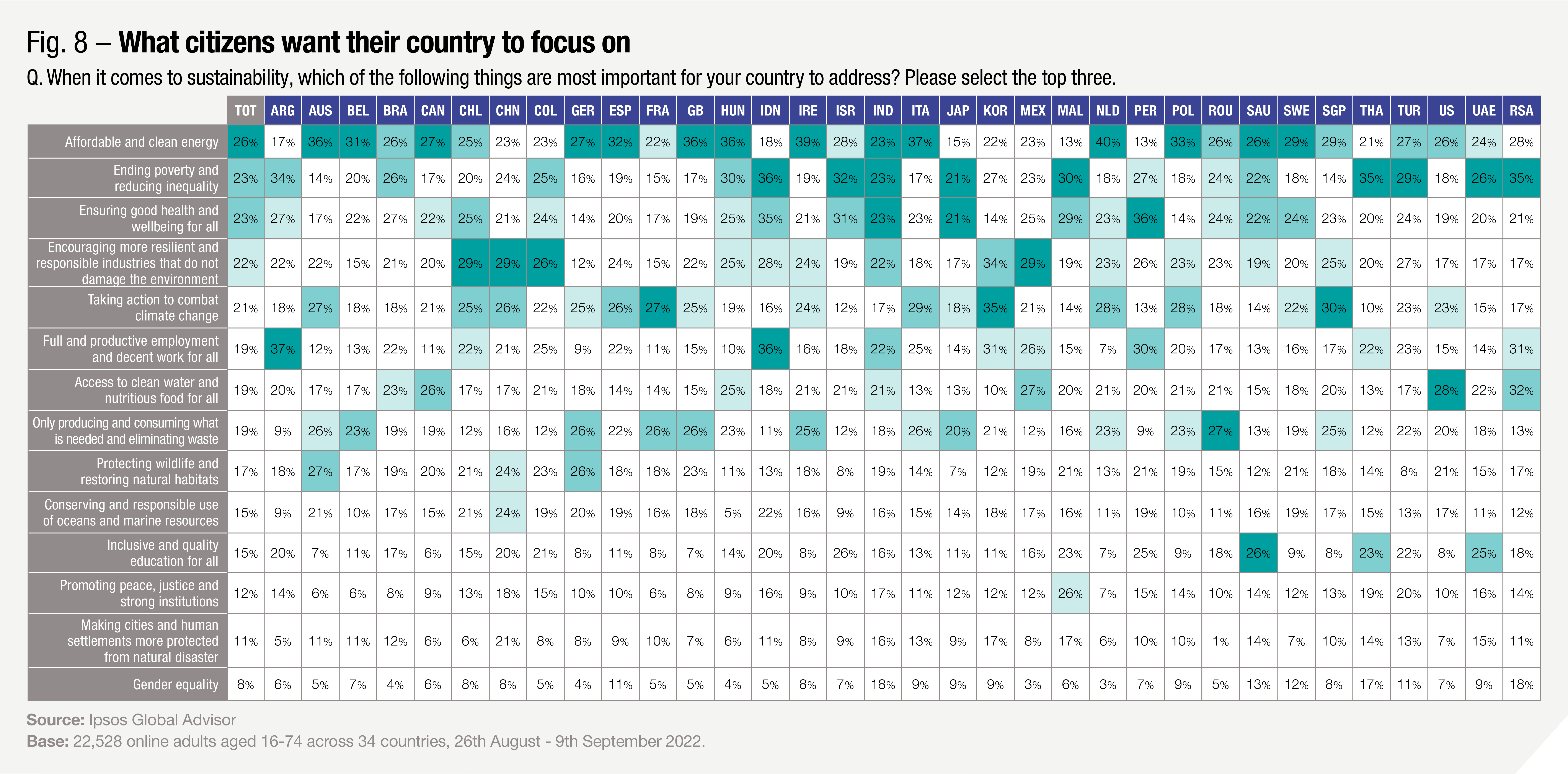
The top five issues that global citizens think it’s most important for their country to address indicates a need to give parallel priority to both social and environmental issues.
 In summary…
In summary…
So the public think of “sustainability” as more linked to environmental action – clean energy, limiting damage to the environment, only producing and consuming what is needed, acting to combat climate change, and conserving and restoring natural habitats and oceans. Vocabulary matters: although “sustainability” is often used interchangeably with “ESG” in business language, it is understood differently by the global public, carrying different specific connotations in different countries. Organisations and businesses must be clear about what they mean in their communications.
But when it comes to acting, issues around society come to the fore. The range of topics making up the top five issues that global citizens consider most important for their country to address indicates a need to give parallel priority to both social and environmental issues.
This is even more clearly the case when we consider citizens’ expectations of multi-national companies. There is a clear need to consider all elements of E, S and G – particularly the ‘S’ which encompasses diversity and inclusivity, working conditions, supporting initiatives that will serve the poor and underserved, as well as health and safety.
As climate change progresses, environmental and social issues will become irrevocably intertwined. As this becomes more evident, awareness will build that our ability to thrive on this planet will be dependent on the need for us to value and bring together all human resources across the globe to ensure a positive and prosperous future.[8] But will this happen quickly enough?
Notes
[1] Ipsos. 2023. “The ESG Imperative: Ipsos foundational perspectives”
[2] Ipsos Synthesio. 2023. “#Sustainability - What It Means to Consumers”
[4] Ipsos. 2023. “What Worries the World - June 2023”. Global Advisor
[5] Ipsos. 2022. “Climate Change: Severity of Effects and Expectations of Displacement”. Global Advisor.
[6] Ipsos. 2021. “How Multinational Corporations Can Lead the Way on Sustainability”
[7] Ipsos & EDF. 2022. “Obs’COP 2022”
[8] Ipsos. 2023. “Earth Day 2023”. Global Advisor
Table of contents
- ESG across borders: the cultural context
- "Sustainability": All on the same page?
- Equality Kaleidoscope
- The climate of climate change opinion
- Applying cultural transferability analysis to ESG
- ESG across borders: United States of America
- ESG across borders: India
- ESG across borders: Brazil
- ESG across borders: South Africa
- ESG across borders: China
| Previous | Next |



![[Webinar] KEYS: What can we learn from what happened in 2025?](/sites/default/files/styles/list_item_image/public/ct/event/2025-12/keys-webinar-what-happened-in-2025-carousel.webp?itok=1gJKCCxx)